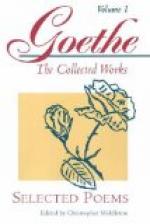Presently denser became the crowd. Round some
of the waggons.
Men in a passion were quarrelling, women also were
screaming.
Then of a sudden approach’d an aged man with
firm footstep
Marching straight up to the fighters; and forthwith
was hush’d the contention,
When he bade them be still, and with fatherly earnestness
threaten’d.
“Are we not yet,” he exclaim’d,
“by misfortune so knitted together,
As to have learnt at length the art of reciprocal
patience
And toleration, though each cannot measure the actions
of others?
Prosperous men indeed may quarrel! Will sorrow
not teach you
How no longer as formerly you should quarrel with
brethren?
Each should give way to each other, when treading
the soil of the stranger,
And, as you hope for mercy yourselves, you should
share your possessions.”
Thus the man address’d them, and all were silent.
In peaceful
Humour the reconciled men look’d after their
cattle and waggons.
When the pastor heard the man discourse in this fashion,
And the foreign magistrate’s peaceful nature
discovered,
He approach’d him in turn, and used this significant
language
“Truly, Father, when nations are living in days
of good fortune,
Drawing their food from the earth, which gladly opens
its treasures,
And its wish’d-for gifts each year and each
month is renewing,
Then all matters go smoothly; each thinks himself
far the wisest,
And the best, and so they exist by the side of each
other,
And the most sensible man no better than others is
reckon’d
For the world moves on, as if by itself and in silence.
But when distress unsettles our usual manner of living,
Pulls down each time-honour’d fabric, and roots
up the seed in our gardens,
Drives the man and his wife far away from the home
they delight in,
Hurries them off in confusion through days and nights
full of anguish,
Ah! then look we around in search of the man who is
wisest,
And no longer in vain he utters his words full of
wisdom.
Tell me whether you be these fugitives’ magistrate,
Father,
Over whose minds you appear to possess such an influence
soothing?
Aye, to-day I could deem you one of the leaders of
old time,
Who through wastes and through deserts conducted the
wandering people;
I could imagine ’twas Joshua I am addressing,
or Moses.”
Then with solemn looks the magistrate answer’d
as follows
“Truly the present times resemble the strangest
of old times,
Which are preserved in the pages of history, sacred
or common.
He in these days who has lived to-day and yesterday
only,
Many a year has lived, events so crowd on each other.
When I reflect back a little, a grey old age I could
fancy
On my head to be lying, and yet my strength is still
active.
Yes, we people in truth may liken ourselves to those
others
Unto whom in a fiery bush appear’d, in a solemn
Moment, the Lord our God; in fire and clouds we behold
him.”




